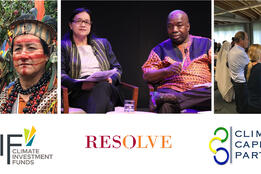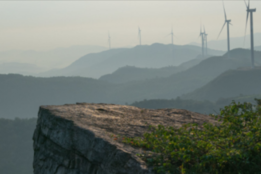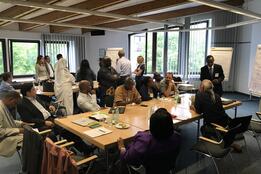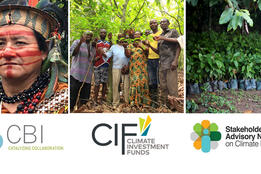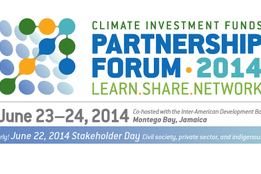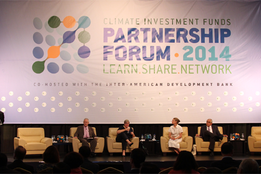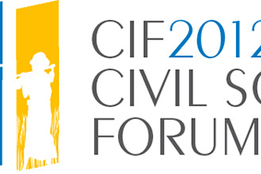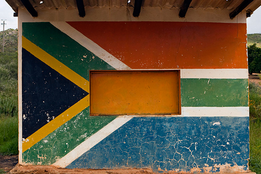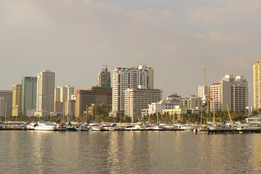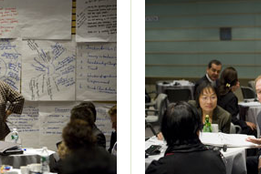The CIF relies on active collaboration and partnership among multiple stakeholders, including national governments, citizen groups, private sector entities, MDBs, UN agencies, and other development partners. Enabling broad input and transparent communication promotes trust, ownership, and more effective action on the ground. In CIF countries, non-government stakeholders from civil society, the private sector, and indigenous peoples and local communities are engaged through information sharing, consultations, and partnerships.
This mandate has revealed the value these stakeholders can add to CIF investment planning and implementation. These same stakeholder groups participate in CIF governance as Official Observers to the Trust Fund Committees and Sub-Committees. The arrangement is unique to the CIF and demonstrates the vital role stakeholders play in broadening perspectives, supporting transparency, and ensuring efficient use of resources.
Stakeholders
Civil Society
The civil society sector is quite broad and includes numerous constituencies such as: non-governmental organizations (NGOs), local community organizations (LCs), labor unions, youth groups, research/think tanks, and foundations. Civil Society Organizations (CSOs) work in a variety of environmental and climate change areas, and carry out numerous single or overlapping activities such as: policy advocacy, service provision, research/training, and communications. In addition, the CIF aims to increase the participation of under-represented constituencies within civil society such as women, youth, peoples with disability, and others in the Stakeholder Observer Program.
Private Sector
The private sector is composed of a wide array of private-sector focused networks and organizations such as: business associations, chambers of commerce, think tanks, and consultancy firms. Private Sector Entities (PSEs) provides the bulk of the investment into climate technologies and the expertise on how investments are made. It is well positioned to bring business reality to the development of viable project models that have the attributes to channel CIF investments and can provide expertise on financial tools that can make these investments more attractive.
Indigenous People
This sector is composed of indigenous people’s organizations which represent regional networks and local indigenous people’s organizations from thousands of ethnicities and tribal groups located throughout the world. The CIF recognizes the deep connection between indigenous peoples and the natural environment in the context of climate change, as well as the sanctity of indigenous cultural practices. Indigenous Peoples Organizations (IPOs) also have a practical knowledge of the environmental sensitivities of the areas where they live, built over centuries of subsistence on the land and observation of climate patterns. They are particularly vulnerable to the effects of climate change and environmental degradation, and have a vested interest in adaptation projects.
Stakeholder Observer Program
The principal way CIF engages civil society and private sector constituencies is through its Stakeholder Observer Program which has been in existence since 2010. Observers are drawn from civil society organizations (CSOs), private sector entities (PSEs), and indigenous peoples’ organizations (IPOSs). Over 40 representatives from these constituencies serve as Official Observers in the Trust Fund Committees and Sub-Committees which decide which climate policies are enacted and projects funded, participate in the formulation of national climate strategies, and monitor the implementation of local CIF-financed climate projects. They also network with and inform the constituencies they represent at the regional and national levels.
Members/Observers
| Civil Society | |
|---|---|
| ActionAID | Sophie Rigg |
| Bank Information Center (BIC) | Ladd Connell |
| Centre for environmental initiatives “Ecoaction” | Natalia Gozak |
| Centro Brasil no Clima | Guilherme Sykris |
| Centro Humboldt | Alejandro Alemán |
| Climate Action Network Southeast Asia (CANSEA) | Nithiyananthan Nesadurai |
| Derecho, Ambiente y Recursos Naturales (DAR) | Claudia Zuniga-Carrillo |
| Federation of Community Forestry Users, Nepal (FECOFUN) | Dil Raj Khanal |
| Federation of Environmental and Ecological Diversity for Agricultural Revampment and Human Rights (FEEDAR & HR) | Tcharbuahbokengo Nfinn |
| Fundación Agreste | Marisa Young |
| Fundación Centro Guatemalteco de Producción más Limpia | Luiz Mariano Muñoz Paredes |
| Global Warming Mitigation Project | Jacquelyn Francis |
| Green Concern for Development (GREENCODE) | Edem Edem |
| Institute for Climate and Sustainable Cities (ICSC) | Angelo Kairos Dela Cruz |
| International Voluntary Organisation for Women, Education and Development (IVOWED) | Benjamin Appiah-Kubi |
| Jeunes Volontaire pour l'Environnement (JVE) | Djibril Niang |
| Neighbour Organization Nepal (NEO-Nepal) | Padam B. Hamal |
| Pan African Climate Justice Alliance | Augustine Njamnshi |
| WOMENVAI | Lylian Coelho Ferreira |
| Indigenous People | |
|---|---|
| Center for Indigenous Peoples Research, Education and Development (CIPRED) | Pasang Dolma |
| Coordinadora de las Organizaciones Indígenas de la Cuenca Amazónica (COICA) | Juan Carlos Jintiach |
| El Centro para la Autonomía y Desarrollo de los Pueblos Indígenas (CADPI) | Dennis Mairena |
| Indigenous Centre for Energy, Environment and Sustainable Development (ICEESD) & MOSOP | Saro Legborsi Pyagbara |
| Indigenous Peoples’ International Centre for Policy Research and Education (Tebtebba) | Grace Balawag |
| Lelewal Foundation | Bouba Njobdi Amadou |
| Pacific Network on Globalization (PANG) | Maureen Penjueli |
| Pastoralist Information Development Organization (PIDO) | Martha Ntoipo |
| Red de Especialistas Indigenas en Finanzas del Clima (REIFC- LAC) and the NMAB (Northern Maya Association of Belize) | Yahaira Vega |
| Tinhinane | Aicha Diallo Hadia |
| Private Sector | |
|---|---|
| Alliance for Rural Electrification (AISBL) | David Lecoque |
| BDI, Federation of German Industries | Tara Nietz |
| Climate Markets and Investment Association (CMIA) | Alexandra Tracy |
| European Chamber of Commerce Vietnam (EUROCHAM) - Green Growth Sector Committee | Gavin Smith |
| Gold Standard | Felicity Spors |
| International Chamber of Commerce (ICC - Argentina) | Nelson Illescas |
| International Chamber of Commerce (ICC – Mexico) | Daniel Basurto Gonzalez |
| IRENA Coalition for Action | Raúl Alfaro-Pelico |
| South Africa National Energy Association (SANEA) | Penelope Herbst |
| Uganda National Chamber of Commerce & Industry (UNCCI) | Olive Zaitun Kigongo |
Events
GET MORE INFORMATION
Please email us if you have any questions regarding the Stakeholder Engagement

